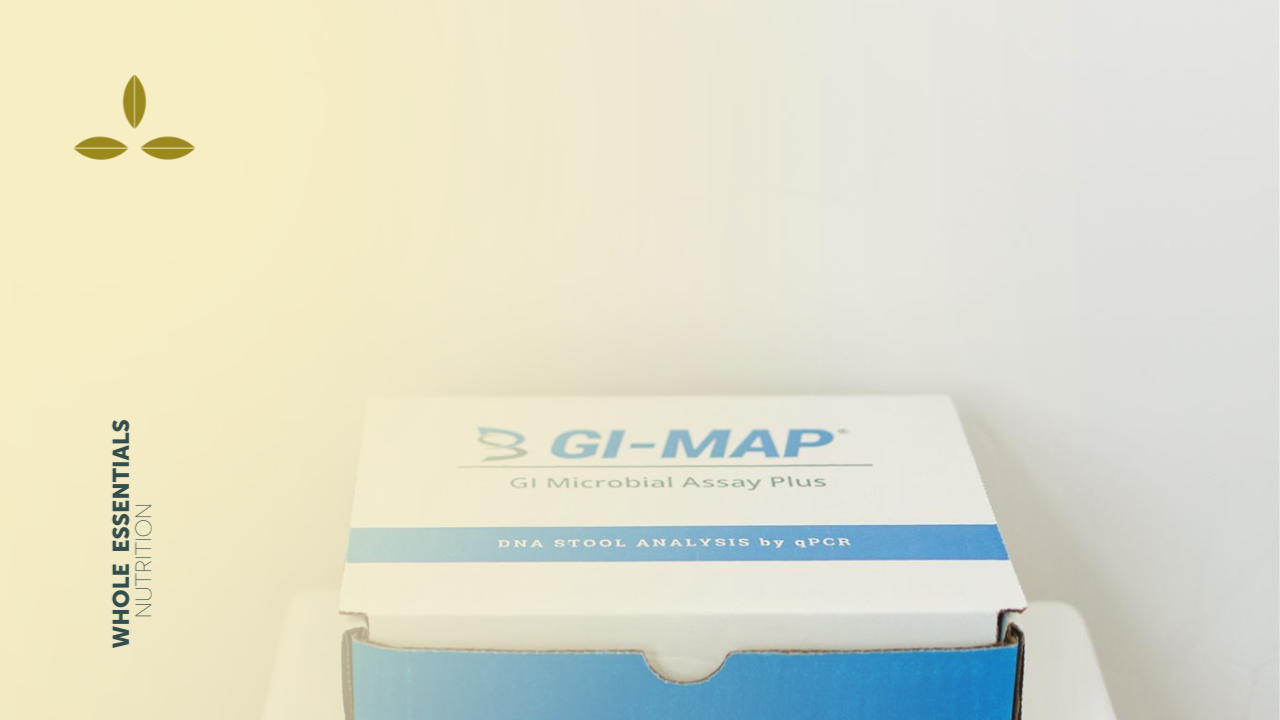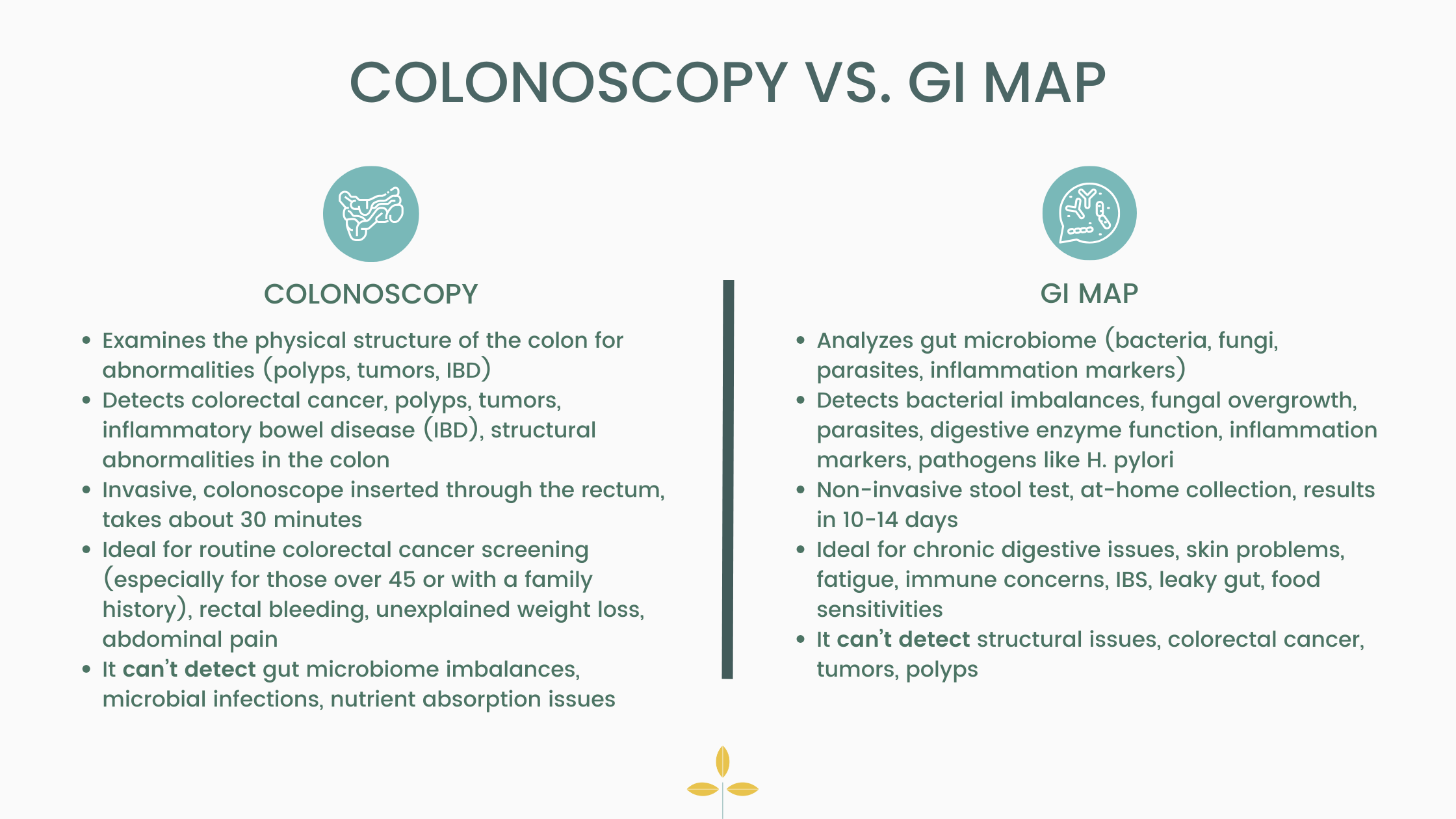GI MAP vs. Colonoscopy: Which One is Right for Your Gut Health?
Mar 30, 2025
You’ve been feeling off for a while now. Your stomach’s been unsettled, your energy is unpredictable, and even meals that should be simple end up causing discomfort. You might have tried eliminating certain foods or adjusting your routine, but nothing seems to bring lasting relief.
The frustration of not knowing what’s going on inside your body can be overwhelming, especially when it feels like you're doing everything right but still aren’t seeing improvement.
At this point, you might be wondering: Is a colonoscopy the best way to figure out what’s wrong with your gut, or is there another tool that could give you more insight into what's happening on a microbial level?
Both the colonoscopy and the GI MAP test are commonly used to diagnose digestive issues, but they focus on different aspects of gut health. Understanding what each test offers and how they complement each other can help you make an informed decision about which path to take for better gut health.
What Is a Colonoscopy, and When Should You Get One?
A colonoscopy is a procedure where a doctor uses a flexible tube with a camera at the end to visually examine the inside of your colon and rectum. It’s typically used to identify structural problems in the colon, such as polyps, tumors, and signs of inflammatory bowel disease (IBD).
It’s considered the gold standard for diagnosing conditions like colorectal cancer and other serious issues that can affect the colon’s function.
Colonoscopy is generally recommended in several scenarios. For instance, if you’re over the age of 45, it’s often advised as a routine screening for colorectal cancer. The American Cancer Society suggests that adults begin colorectal cancer screenings at this age, or earlier if there is a family history of the disease.
Additionally, if you’re experiencing symptoms like rectal bleeding, unexplained weight loss, or persistent changes in your bowel habits, your doctor may recommend a colonoscopy to rule out serious conditions.
However, the colonoscopy is limited in that it only examines the physical structure of the colon. It does not provide information about the microbial health of the gut or issues related to the gut's ability to digest and absorb nutrients. This is where a test like the GI MAP comes in, offering a completely different perspective.
What Is a GI MAP Test, and What Does It Reveal?
The GI MAP test (Gastrointestinal Microbial Assay Plus) is a stool test that analyzes your gut microbiome, aka the trillions of bacteria, fungi, viruses, and other microorganisms living in your digestive tract. Unlike a colonoscopy, which focuses on the structure of the colon, the GI MAP gives you a look into how your gut is functioning on a microbial level.
Through this test, you can gain insights into several important factors that affect your digestive health. For example, the GI MAP can reveal whether there’s an overgrowth of harmful bacteria in the gut, such as Clostridium difficile or H. pylori, both of which can cause serious digestive issues and discomfort.
It also identifies imbalances in gut bacteria, such as an overgrowth of harmful microbes and a lack of beneficial ones, which can contribute to conditions like irritable bowel syndrome (IBS), fatigue, and skin issues like acne or eczema.
One of the most valuable aspects of the GI MAP is its ability to identify inflammation markers in the gut. Chronic inflammation can lead to a variety of health problems, including leaky gut. This inflammation has been linked to numerous health conditions, including autoimmune diseases, digestive disturbances, and even mental health issues like depression and anxiety.
Additionally, the GI MAP tests for fungal overgrowth and parasites, both of which can contribute to symptoms like bloating, fatigue, and digestive discomfort. Many people aren’t aware that fungal infections or parasites in the gut can cause significant health issues, and these imbalances won’t be detected by a colonoscopy.
Colonoscopy vs. GI MAP
There’s often confusion around whether the GI MAP test and colonoscopy are interchangeable, but in reality, they complement each other well. Each test provides insight into different aspects of gut health, and together, they offer a complete picture of your digestive system.
The GI MAP test is a microbial diagnostic tool, offering an in-depth look at the balance in your gut. It’s ideal for people experiencing ongoing digestive symptoms like bloating, gas, constipation, and diarrhea that don’t have clear physical causes.
On the other hand, a colonoscopy is the most effective tool for identifying structural problems in the colon, such as tumors, polyps, rectal bleeding, and inflammatory bowel disease.
The two tests work together because they look at different aspects of your health. If a colonoscopy comes back normal but you’re still experiencing symptoms, the GI MAP might uncover microbial imbalances or infections that the colonoscopy couldn’t detect.
For example, let’s say you’ve been dealing with chronic bloating and discomfort for months. You go for a colonoscopy, and the results come back clear. However, the GI MAP test could reveal an overgrowth of harmful bacteria, a fungal imbalance, or a parasitic infection, all of which might be causing your symptoms.
This demonstrates how the GI MAP offers a different kind of insight, focusing on the functionality of your digestive system rather than its physical structure.
Who Should Consider a GI MAP Test Before a Colonoscopy?
The GI MAP test is especially useful if you're experiencing persistent digestive symptoms without clear signs of structural problems that might require a colonoscopy. It’s a great option if you’re dealing with symptoms that don’t have an obvious cause, such as:
- Chronic bloating or gas that doesn’t seem to resolve with diet changes.
- Irregular bowel movements, like alternating between diarrhea and constipation.
- Food sensitivities that seem to trigger discomfort but aren’t linked to any obvious digestive diseases.
- Chronic fatigue, which can be a sign of microbial imbalances affecting energy levels.
- Skin issues, such as eczema or acne.
- Mental health symptoms like anxiety, depression, or brain fog.
- Frequent infections or a weakened immune system, as gut health plays a key role in immune function.
If you’ve had persistent symptoms like these but haven’t had a colonoscopy or haven’t found relief from diet adjustments, the GI MAP test may be the right starting point. It can help uncover microbial imbalances, parasites, or inflammation that could be affecting your digestive system and overall health.
However, if you’re over 45, have a family history of colorectal cancer, or are experiencing signs that suggest more serious structural issues (like rectal bleeding or unexplained weight loss), a colonoscopy should be prioritized.
My Functional Approach to Gut Healing
As a functional nutritionist, I take a holistic approach to gut health by addressing the root causes of digestive issues. The GI MAP test is one of the most effective tools I use to identify underlying imbalances in my clients’ gut microbiomes.
Using the results, I create personalized plans that combine diet, lifestyle changes, and targeted supplements to support gut health and overall well-being.
In my Gut Restore Program, the GI MAP test results are used to develop a tailored strategy that focuses on:
- Rebalancing gut bacteria to improve digestion and reduce discomfort.
- Healing leaky gut and lowering systemic inflammation.
- Eliminating pathogens like parasites, candida, and H. pylori.
- Supporting immune function by restoring a healthy microbiome.
- Improving mental clarity and energy levels by optimizing gut-brain communication.
If you’ve had a colonoscopy that came back normal but are still struggling with symptoms, or if you’re unsure which test to take first, a GI MAP test may help uncover the root cause and provide the answers you’ve been looking for.
Frequently Asked Questions (FAQs)
Now that you know the difference between these two tests, below are a few GI MAP-specific frequently asked questions. You can connect with your healthcare practitioner for answers to your colonoscopy questions.
Is a GI MAP test covered by insurance?
Most insurance plans do not cover the GI MAP test, as it is considered a functional medicine test and not a standard diagnostic procedure. However, many people find the investment worthwhile due to the valuable insights it provides into gut health, especially if they’ve been struggling with digestive issues and have not found relief through traditional methods.
How do I take a GI MAP test?
The GI MAP test is simple and convenient to take at home. You’ll be provided with a stool sample collection kit that allows you to collect a sample in the privacy of your home. Once collected, you send the sample to the lab for analysis, and you can typically expect results in 10-14 days. This test gives you a comprehensive picture of your gut microbiome without the need for invasive procedures.
Can I take a GI MAP test if I’ve already had a colonoscopy?
Absolutely! The GI MAP test and a colonoscopy serve different purposes and can be taken together. A colonoscopy focuses on the structural side of gut health, helping to identify issues like polyps or cancer. In contrast, the GI MAP test provides insights into the microbial health of your gut, looking at things like bacteria, fungi, parasites, and inflammation markers. Many people find that both tests are helpful for deciphering their gut health from multiple angles.
How long does it take to get results from a GI MAP test?
After submitting your stool sample, results from the GI MAP test typically arrive within 10-14 days. The comprehensive analysis of your gut microbiome takes time, but it provides detailed information on your gut health, which can help guide the next steps in your healing process.
Luckily, You Have Next Step Options For Healing Your Gut Health
Exploring and nurturing your gut health on a deeper level is the first step toward feeling better. You can:
- Book a consultation to see if the GI MAP test is the right option for you.
- Learn more about my Gut Restore Program, which combines functional testing with personalized nutrition support.
- Or, if you’re not sure where to start, take my Gut Health Assessment to get insights into your digestive health.
Taking the right steps to improve your gut health starts with choosing the tools that give you the most accurate insights. A GI MAP test and a colonoscopy each provide important information, but they look at your health from different angles.
If you’re dealing with chronic digestive issues or suspect that something is off in your gut, these tests can help identify the underlying causes and guide you on the path to better health.
DON’T MISS THIS!
START YOUR PATH TO BETTER HEALTH
Take our free Gut Health Assessment today and discover personalized steps to improve your digestion and well-being. Don’t wait—unlock the key to a healthier you now!



